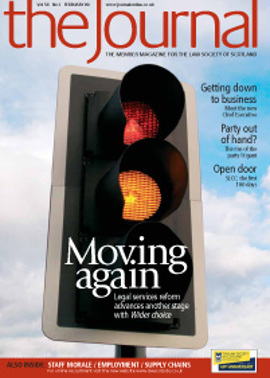Positive returns

The recent changes in the economy have taken everyone by surprise and as a result, people are naturally anxious about what these will ultimately mean for them, their families and their future. Earlier articles in the Journal have focused on the importance of looking long term and having a clear plan about what needs to be done. In this article, I intend to cover managing the impact of so much sudden and enforced change, lessons learned from the last time this happened, and the effect on morale and motivation of staff, clients and partners.
The Law Society of Scotland’s economic impact survey reported in December that 70% of the firms that responded intended to maintain their current business model, at the same time as 75% of respondents predicted a downturn in profitability. By then, 304 staff had already been made redundant with another 150 predicted from these sample firms this year.
Making people redundant has a direct effect on the individuals who find themselves, through no fault of their own, without an income and a career. For the partners and managers in the firm making that decision, it will have caused them a great deal of worry and concern. It will also have had a knock-on effect on everyone in the firm, with the survivors being asked to take on additional roles and responsibilities, as well as dealing with the loss of colleagues who may well have been friends.
If my experience of the early 1990s is anything to go by, pressure on profits causes cracks to appear in partnership relationships. When people are busy and making money, the fact that they feel that another department does not contribute as much to the overall profits as they do does not seem to matter so much as when profits dry up. However, when fees are down, and people have too much time on their hands, those with the loudest voices can be heard saying that “so and so is a waste of space”, or “that office is a drain on all of us”. Quite apart from the unpleasantness this can cause at formal partners’ meetings, it can lead to direct conflict within the firm, adding to the feeling of tension amongst the support staff.
Lessons learned from last time
What can we learn from the last recession in the early 1990s? At that time, some firms asked senior partners to retire earlier than planned, or chose particular partners to be “culled”. Whilst that provided an immediate solution to reduced profits, later on these firms realised that they had lost some good clients by not taking enough care of them during the transition.
Other firms, looking for a way of sharing their overheads, merged with another business. Often this resulted in management time spent dealing with the transition of staff and business arrangements, yet achieved no economies of scale. With the benefit of hindsight, those involved felt that it would have been better to have soldiered on alone or waited for a merger partner that would have brought positive benefits.
Across the profession, there was a cutback on trainee recruitment, and newly qualifieds especially in commercial property were made redundant, with the result that when work levels increased a few years later, firms had difficulty finding properly trained and experienced assistants.
These are important lessons and should not be ignored in the present climate. We do not know how long this downturn will last and there may be casualties along the way, but the legal profession in Scotland provides a needed service and successful firms will be those who provide value for money.
Sustaining morale and motivation
Having been a commercial property partner during the early 1990s, I know how hard it is to keep people motivated when they do not have enough work to do. In addition, with so much of fee-earners’ performance based on their chargeable time, when suddenly people are not busy, they feel vulnerable. This will make them worried and stressed – and stressed people make mistakes, adding to their feeling of vulnerability.
Keeping people busy and motivated is important. We can tackle a lot of housekeeping jobs that we meant to do and never got round to. This includes sorting out files, setting up templates, providing typing and software training to professional staff in particular. Support staff can also be offered training in paralegal aspects of their work. Project teams can be set up to look at how work is done, with the aim of developing systems and processes to allow it to be done more cost effectively and with less risk. This approach will only succeed, however, if people feel comfortable and secure in their jobs, as they are unlikely to be willing to share their knowledge and skills if they think this will make them redundant.
I appreciate that most firms have already offered staff the chance to work fewer hours for less pay, but it is also possible to allow people to work fewer hours for the same pay. This may feel like a hard pill to swallow, but there are a number of direct and indirect benefits that will result. First of all, people will get through just as much work rather than extend the time it takes to fill the hours available. Secondly, making people stay in the office when there is not enough to do causes resentment, and idle people make mischief. Thirdly, one of the main ways to cope with the worry and stress is to stay fit and healthy. Allowing people an afternoon off a week to take some exercise, pick their kids up from school or do whatever they need to do to get a perspective on what is important will pay dividends in their morale and motivation at work.
Be generous with our clients
Another area where we can be more generous is with our clients. Most firms will have already written to clients offering them the chance to review their wills or property portfolio. In my view, going to see as many of them as possible, “free of charge”, would also pay short and long term dividends. Getting out to see clients will allow professionals to feel they are doing something worthwhile, and finding out what is worrying clients will help inform the firm’s business plans, promotional leaflets and the advice it provides. Building client loyalty during 2009 will pay significant dividends into 2010 and beyond.
Managing conflict
Inevitably there will be some conflict within firms as we all struggle with so much change and pressure on income, overheads and fees. We are familiar with the two types of responses to stress – fight or flight. Some lawyers have high “fight” responses and want to know why this problem has arisen, whose fault it is and who is to blame. The reality of this current situation is that everyone – even the most skilled economic analysts – got it wrong, so decisions made by any firm about taking on expensive new office space, recruiting rafts of trainees or headhunting new teams of people are now likely to look questionable. However, that is not the issue and achieves nothing constructive. People should therefore tone down aggressive behaviour and appreciate the need to focus on moving forward rather than looking back.
People who adopt a “flight” response also cause problems as they bury their heads in the sand, refuse to speak about what is worrying them and generally duck any attempt to get them to change and adapt. This often results in frustrations which further infuriate the “fighters”. Again the “flighters” must learn to face up to the reality of the current situation and take responsibility in helping to move the firm forward in a positive way.
Keep control
The legal profession in Scotland has been tackling fairly radical change for some years now, so we have become more comfortable with it. The current climate has thrown everyone into a sudden loss of property and financial services work – the cash cow of many firms, with the result that a rapid replacement of fee income is not possible.
I have worked with many successful leaders of professional firms, and one attribute they all demonstrate is a sense of calmness and being in control of what is happening. As covered in this article and in more detail in the new edition of my second book Accelerated Best Practice – implementing success in professional firms, it is possible to manage the impact of change in a positive and constructive way.
In this issue
- Cross-border disputes: new rules
- Beyond the downturn
- Take a business view
- Amber alert
- ARTL - time to reflect
- Jack to the future
- Party time
- Head of steam
- Big names for Society's big date
- Employment: without prejudice
- Simple steps
- Taken on credit
- Positive returns
- Electrical storm on the horizon?
- What's on file?
- Ask Ash
- New cases, old problems
- Fair sharing of less
- Beware - simpler rules
- Shifting sands
- Offer you can't refuse
- Website review
- Book reviews
- Weakest link
- Servitudes - new ground?






